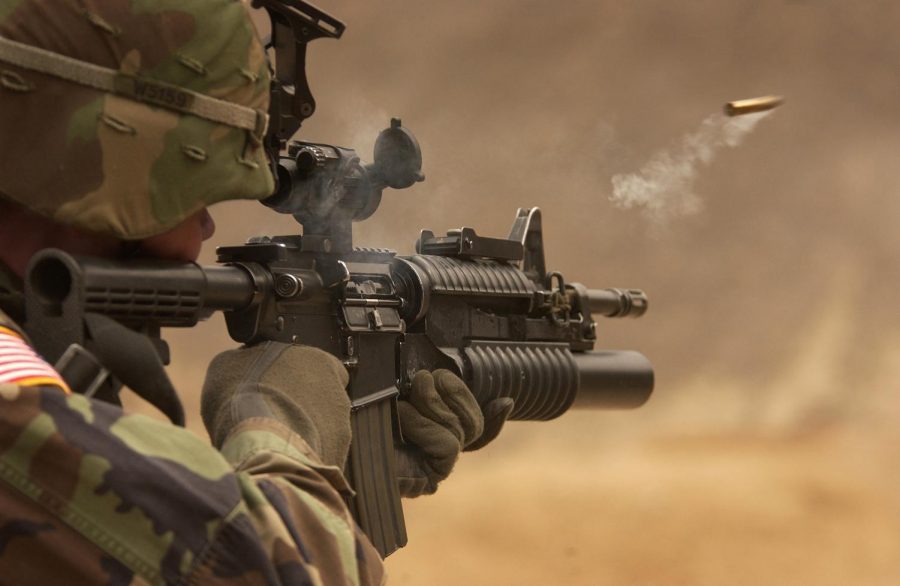Looking back at the Iraq War
The Iraq War started 18 years ago and lasted until the final removal of troops in 2020. That being said, as Rawwas argues, the impact in withstanding.
Apr 8, 2021
2021 marks the eighteenth year of the invasion and occupation of the once-sovereign nation of Iraq. I say once-sovereign to note the fact that the American-helmed invasion of Iraq in 2003 was not sanctioned by the United Nations Security Council and was not carried out in self-defense, thus being illegal under international law. As it was an unprovoked attack against an ostensibly sovereign nation, I’d like to also mark the fact that Iraq has never been sovereign since. Even after the supposed “end” of the occupation and the transition to Iraqi governance, the United States has maintained a military presence in the country, even after the Iraqi Council of Representatives called for all foreign troops to be expelled from Iraq in early 2020.
The United States continues its illegal occupation of Iraq to this day, in flagrant denial of any notion of sovereignty for the country. Regardless, it might be productive to look back on the history of the Iraq War and to draw critical implications for the foreign policy of today.
The dress rehearsal for the 2003 invasion of Iraq, of course, was the 1990-1991 Gulf War, in which former President George H. W. Bush invaded Iraq in a gesture to be repeated by his son. Jean Baudrillard famously proclaimed that “the Gulf War did not take place,” meaning that it was a manufactured pseudo-conflict more akin to a massacre than a war.
The United States had basically baited Saddam Hussein into invading Kuwait, claiming that they had no qualms about it, only to turn around and pretend to care deeply about this act of aggression, and rallying the international community to the war frenzy. The Gulf War is perhaps best known for the “Highway of Death,” in which American, Canadian, British and French forces attacked retreating Iraqi soldiers, killing hundreds. Or perhaps one remembers the Amiriyah shelter bombing, in which the United States Air Force killed over 400 civilians when it bombed a shelter filled with women and children.
What would follow would be a slate of sanctions imposed on Iraq by the U.S. that would result in the deaths of hundreds of thousands of children, due to an inability to access proper medical supplies. As the Marx quote goes, what was first a tragedy would later be repeated as a farce, as the 2003 invasion of Iraq clearly marked.
We all know of the lies that the Bush administration told to sell the war to the American public, the non-existent ties between Saddam Hussein and al-Qaeda, the non-existent “weapons of mass destruction.” More importantly, a country having weapons of mass destruction would not be a legitimate pretext for invading said country, especially by a country that certainly has weapons of mass destruction, yet maintains that this is an exclusive right of itself and its allies.
We could also recount the tales of horror, the hundreds of thousands of casualties, the use of depleted uranium rounds that still cause cancer to this day, the use of white phosphorus in Fallujah, a chemical weapon banned under international law (and ironically what we were accusing Saddam of harboring). Or we could mention Abu Ghraib, the torture site where prisoners, most of them innocent Iraqi civilians, were subjected to all kinds of physical and psychological degradation, even being forced to rape each other, which functioned as a radicalization center from which would emerge key figures of ISIL. All of that seems to follow from the invasion and occupation of a foreign country.
Rather, the issue at hand is that none of the lessons of the Iraq War have been learned. former President George W. Bush, “butcher-in-chief,” has been rehabilitated as a #Resistance liberal hero for some mild criticisms of Trump’s demeanor.
Biden’s new Secretary of State Blinken decries the state of democracy in Bolivia because the rightfully elected government has prosecuted the fascist that orchestrated a coup and deposed them of power, with little awareness that these are the same lies that every U.S. administration gives when dealing with foreign countries. It is perhaps time we learned to gaze a bit more skeptically at the claims of the U.S. government, especially when it comes to foreign policy, regardless of the administration in power.
















